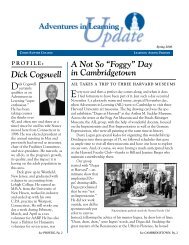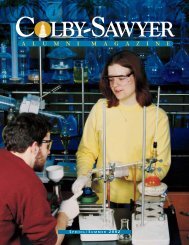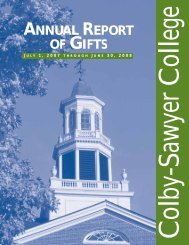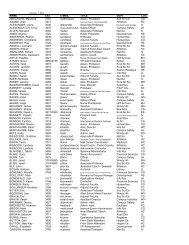A L U M N I M A G A Z I N E - Colby-Sawyer College
A L U M N I M A G A Z I N E - Colby-Sawyer College
A L U M N I M A G A Z I N E - Colby-Sawyer College
Create successful ePaper yourself
Turn your PDF publications into a flip-book with our unique Google optimized e-Paper software.
Sealed evidence bags are brought to the exam table where they will be opened and prepared by Kim for a<br />
serology exam. This exam will determine which bodily fluids are present.<br />
Kimberly “Kim” Fish Rumrill ’84 is a warm, highly intelligent<br />
woman with a calm demeanor and a ready smile.<br />
She’s also a wife, mother of two teenagers, homemaker,<br />
and dogged puzzle solver for the New Hampshire State Police<br />
Forensic Science Laboratory in Concord, N.H. Her official title<br />
is Criminalist II, and her expertise is serology, the science that<br />
deals with serums, especially blood.<br />
Kim’s major at <strong>Colby</strong>-<strong>Sawyer</strong> was Medical Technology, and<br />
she says the hands-on skills she was taught gave her a strong<br />
foundation for all the science fields in which she’s worked. She<br />
remembers with fondness professors such as Kathy Springsteen,<br />
Larry Dufault, Peter Mitchell and Helen Morrison. It was from<br />
them that she learned anatomy and physiology, microbiology,<br />
toxicology, child psychology, and the other sciences that<br />
started her on her career path.<br />
“I remember they all seemed to have a good sense of<br />
humor,” Kim says, smiling at the recollection, “and the small<br />
class sizes made it easy to connect with them. It allowed them<br />
to know us as individuals<br />
and to specifically tailor the<br />
amount of help they offered<br />
each of us.<br />
“I never got bored<br />
because a lot of the girls<br />
in my dorm were Med<br />
Tech students, so there was<br />
always a lot of camaraderie.<br />
I remember it used to get<br />
a little cold sometimes on<br />
the third floor of Burpee in<br />
the winter, so we’d study in<br />
the hall where we’d line up<br />
our hot air popcorn poppers<br />
down the hallway and get<br />
them going while we drank<br />
our two liter bottles of Tab.”<br />
Kim’s father was a<br />
detective, and law enforce-<br />
ment was in her blood,<br />
so to speak. After <strong>Colby</strong>-<br />
<strong>Sawyer</strong>, she found a job as<br />
18 COLBY-SAWYER ALUMNI MAGAZINE<br />
Kim is seen here performing presumptive tests for bodily fluids. Among the<br />
presumptive tests that can be done are those for common fluids such as blood,<br />
sweat, saliva, and urine.<br />
Biohazard waste containers are used for safe<br />
disposal of used swabs and other detritus from the<br />
forensic laboratory.<br />
a medical technologist in Keene, N.H., at the Keene Clinic.<br />
Meanwhile, she was developing an interest in forensic science<br />
from reading her father’s professional detective magazines. She<br />
soon found herself going back to school at the University of<br />
New Haven (UNH) to study forensic science.<br />
After graduation from UNH, Kim was told that you needed<br />
to wait for someone to die or retire in order to get a job in the<br />
N.H. State Police Forensic Science Laboratory. During a stint<br />
as a medical technologist at Dartmouth-Hitchcock Medical<br />
Center, Kim found that someone had, indeed, retired, and she<br />
was chosen to fill the position. That was 15 years ago.<br />
When asked what type of evidence she receives and from<br />
whom, Kim says, “We receive our evidence from all police<br />
agencies in the State of New Hampshire, and some even comes<br />
from the FBI. We may receive evidence as diverse as swabs<br />
collected from crime scenes, sexual assault kits from hospitals,<br />
carpeting from a doctor’s office or a car, weapons, all sorts of<br />
things, you name it.<br />
“Because I’m a serologist,<br />
once evidence reaches our lab,<br />
I have the opportunity to participate<br />
in solving crimes having<br />
to do with blood or other<br />
bodily fluids, as well as DNA,<br />
which means I’m involved<br />
in helping to solve sexual<br />
assault and homicide cases. I<br />
take the evidence, which has<br />
either been bagged or placed<br />
in appropriate containers, to<br />
an examination room where<br />
it’s spread out on clean, white<br />
paper on an exam table.”<br />
Kim is a serologist, but<br />
a more colloquial term for<br />
her expertise is blood spatter<br />
expert. She explains that<br />
phrase as she seems to do<br />
everything, carefully and<br />
patiently. “A blood spatter<br />
expert is someone who studies









